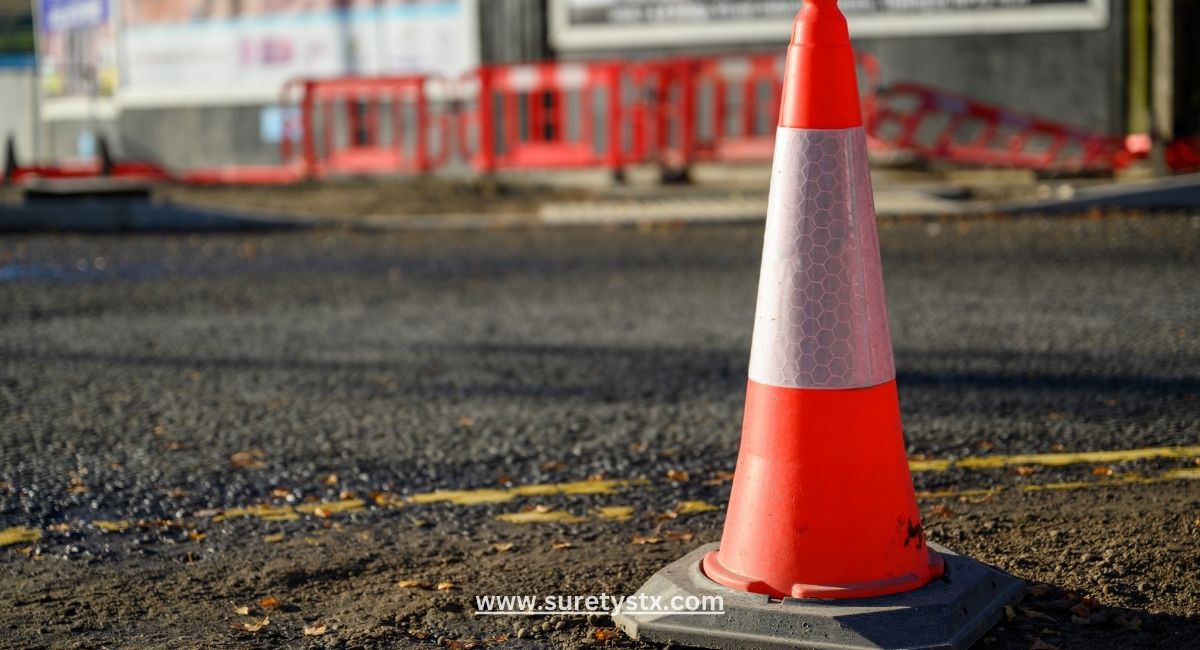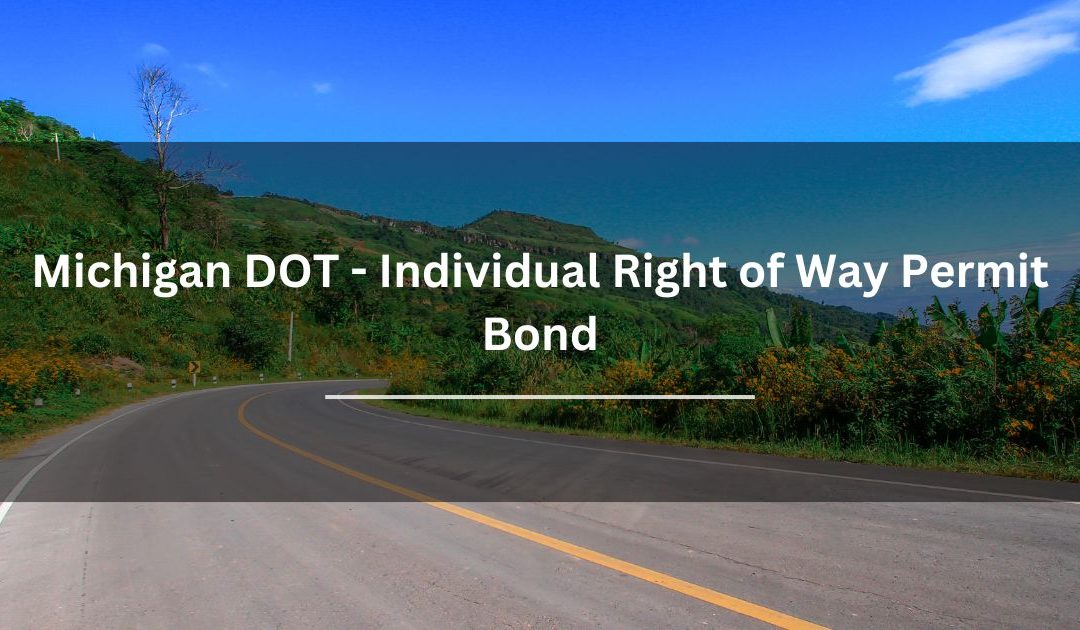Get an Instant Quote on Individual Right of Way Permit Bond
Introduction
From our perspective, contractors who work near Michigan’s state roads understand the challenge of complying with state-level regulations. Whether you're installing utilities, widening a driveway, or trenching near a right of way, your project likely requires permission from the Michigan Department of Transportation (MDOT). And to get that permit, you’ll need the Michigan DOT - Individual Right of Way Permit Bond.
This bond is a safeguard for MDOT, providing a financial guarantee that any damage to state-owned property caused by your construction activities will be repaired. It also assures that your work will comply with MDOT standards for safety, quality, and environmental protection.
For contractors who frequently work within municipal boundaries, this bond is similar in intent to local bonds like the Acme Township, MI - Landscape Permit ($20,000) Bond, which protects township property during landscape construction. In both cases, the bond serves as a promise to restore disturbed land, sidewalks, or curbs to their original condition—or cover the cost of repair if you don't.
Permit Bonding Can Be Confusing
We’ve noticed that contractors often misunderstand what the Michigan DOT - Individual Right of Way Permit Bond actually does. Some believe it's optional. Others assume it's covered by insurance. In truth, it’s a required part of your permit application when working within a Michigan state highway right-of-way. Without it, your permit request will be denied.
Another common mistake is confusing this individual bond with general environmental or construction bonds, such as the Michigan - Materials Management / Processing and Transfer Facility Bond, which is tied to environmental compliance at waste handling sites. These bonds are entirely different in purpose and are not interchangeable.
Contractors who don’t understand which bond they need often waste time submitting incorrect documents. This delays their projects, frustrates state officials, and may cause them to miss tight deadlines for public work or seasonal construction.

Swiftbonds Simplifies the Process
Based on our experience, the fastest path to compliance starts with a bonding partner who understands state-level requirements. Swiftbonds has helped hundreds of Michigan contractors file the Michigan DOT - Individual Right of Way Permit Bond accurately and on time.
Our process starts with a short application. Once approved, we issue your bond in the exact format required by MDOT, complete with your permit number, work location, and the required amount. Most bonds are issued in less than 24 hours.
Swiftbonds also assists contractors working on municipal projects, such as those required to post the Acme Township, MI - Landscape Permit ($20,000) Bond. Whether your work affects a small neighborhood sidewalk or a major state highway, our team ensures your bond is compliant and accepted by the issuing agency.

How to Secure the Right of Way Bond
What we’ve discovered is that bonding for a Michigan DOT permit is straightforward when you follow these steps:
-
Identify if your project falls within MDOT jurisdiction
This includes any work within a state-owned road, shoulder, or highway right-of-way. -
Confirm the bond requirement with MDOT
Most permits will require the Michigan DOT - Individual Right of Way Permit Bond, with the amount based on the scope of work. -
Apply for the bond through Swiftbonds
Submit your contractor information, project details, and bond amount. -
Pay the bond premium
Rates typically range from 1% to 3% of the bond value, depending on credit and project risk. -
Submit the bond with your permit application
MDOT will not approve the permit without the bond in hand.
This is similar to the process used by municipalities that require the Acme Township, MI - Landscape Permit ($20,000) Bond for landscaping jobs. In both cases, the bond must be filed before the permit is issued.

Late Bonds Disrupt Schedules
We’ve found that failing to start the bonding process early can put your project timeline at risk. MDOT requires the bond to be in place before it will issue a right-of-way permit. And if the form or amount is incorrect, the application will be rejected.
Delays can cascade quickly—equipment rentals may be postponed, crew schedules adjusted, and weather windows missed. For contractors operating under public contracts or subcontracting with tight delivery dates, a one-week delay in bonding could lead to serious penalties or loss of business.
This mirrors what happens in local jurisdictions. For example, in Acme Township, submitting a late or incorrect Acme Township, MI - Landscape Permit ($20,000) Bond can prevent you from breaking ground. Whether local or state, the clock starts with the bond.

Incorrect Bonds Lead to Liability
In our observation, submitting the wrong bond or omitting it entirely carries real consequences. Without the Michigan DOT - Individual Right of Way Permit Bond, your permit won’t be approved. If you proceed without one, MDOT may halt your project or fine your business.
And if your construction work damages pavement, utilities, or traffic control infrastructure, the cost of repairs could be significant. The bond acts as a financial guarantee for MDOT, ensuring it won’t be left with unpaid repair bills if your company doesn’t restore the area.
Using the wrong bond—such as a landfill-related financial assurance bond like the Michigan - Materials Management / Processing and Transfer Facility Bond—can also backfire. Not only will MDOT reject it, but repeated errors can damage your credibility and reduce future bid success.
Right Bonds Build Credibility
We’ve learned that contractors who consistently provide the correct bond documents are viewed as responsible, professional, and easy to work with. Submitting the Michigan DOT - Individual Right of Way Permit Bond on time and in the correct format makes it easier for MDOT to approve your permit, schedule inspections, and coordinate your work with other infrastructure projects.
It also helps your team avoid costly rework. When your bond application is handled correctly, your team can move quickly through permitting and stay on track with your construction schedule.
Swiftbonds gives you that peace of mind. Whether you're applying for a highway encroachment permit, posting an Acme Township, MI - Landscape Permit ($20,000) Bond, or managing compliance for waste processing under the Michigan - Materials Management / Processing and Transfer Facility Bond, we help you stay focused on the job—not the paperwork.
Michigan Bonding Law and Regulatory Compliance
The Michigan Little Miller Act (MCL 129.201–129.211) outlines bonding requirements for public projects exceeding $50,000, typically involving performance and payment bonds. While that statute applies mainly to construction contractors, MDOT uses a separate permitting framework that requires surety bonds as a condition for accessing and working within the public right-of-way.
The Michigan DOT - Individual Right of Way Permit Bond is regulated through MDOT’s Utility Coordination and Permit Program. This bond is separate from construction bonding and is required regardless of project size if public space is affected.
For official bond specifications, application instructions, and permit forms, contractors should consult:
Conclusion
We’ve come to appreciate how the Michigan DOT - Individual Right of Way Permit Bond gives contractors a structured, consistent way to meet state bonding requirements and gain access to public right-of-way areas. It protects public property and provides peace of mind to MDOT, while giving contractors the green light to begin work.
Swiftbonds is ready to help you move forward. Whether you're working on a state highway, installing landscaping under the Acme Township, MI - Landscape Permit ($20,000) Bond, or operating a facility that needs a Michigan - Materials Management / Processing and Transfer Facility Bond, we’ll make sure you get the right bond—fast and correctly.
Frequently Asked Questions
When is the individual right of way bond required?
We’ve often noticed that contractors ask this. The bond is required any time a project disturbs state-managed land within a highway right-of-way. This includes driveways, signage, trenching, and utility access.
Is this the same as a construction performance bond?
We’ve often noticed confusion here. No, this is not the same. The Michigan DOT - Individual Right of Way Permit Bond ensures restoration of public land, while performance bonds guarantee a contract’s completion.
Can I use a bond from a different agency?
We’ve often noticed contractors think they can reuse bonds. You cannot. A local bond like the Acme Township, MI - Landscape Permit ($20,000) Bond cannot replace an MDOT-required bond.
Does MDOT accept environmental facility bonds for permits?
We’ve often noticed this mistake. No. The Michigan - Materials Management / Processing and Transfer Facility Bond applies only to environmental waste facilities and is not accepted for road access or utility work.


